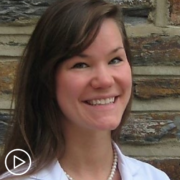Educational Resources for CLL Patients
Educational Resources for CLL Patients from Patient Empowerment Network on Vimeo.
How can chronic lymphocytic leukemia (CLL) patients learn more about their disease? Dr. Seema Bhat recommends resources and online communities for CLL patients looking for more information.
Seema Bhat, MD is a hematologist at The Ohio State University Comprehensive Cancer Center – The James. Learn more about Dr. Bhat.
Related Resources:

|

|

|
Transcript:
Katherine:
Many CLL community members are interested in learning more about their disease. So, for newly diagnosed patients, what are a few educational resources you recommend to help them learn more about their condition?
Dr. Bhat:
There are a number of well-established support groups or educational resources for our patients. These include the CLL Society, The Leukemia & Lymphoma Society, Lymphoma Research Foundation, and then we have Patient Empowerment Network, and we have Patient Power. All these resources provide support groups, organize webinars, and have educational material for our patients.
Katherine:
What about patients who have been living with CLL for many years, or are quite knowledgeable about their disease? Are there more advanced resources for patients to stay up to date on the latest research and treatment?
Dr. Bhat:
So, for patients who want to search for additional resources, especially looking for clinical trials, going on this website called clinicaltrials.gov, they can first search for CLL-related clinical trials. Also, NCCN, or “National Comprehensive Cancer Network,” has patient resources for each disease, and then they can find information on CLL there, also. I would also like to say that Google is a good resource, as long as you know where it is taking you.
Katherine:
Exactly. You may not be able to rely on everything you find.
Dr. Bhat:
Right.






